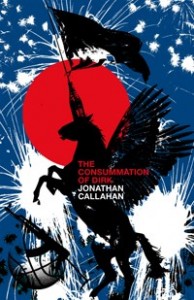333 pages, $16.00
Review by: Michael Christian
The stories in Jonathan Callahan’s collection The Consummation of Dirk, winner of the eighth Starcherone Prize for Innovative Fiction, for all their stylistic variation, often circle back around to meditations on suicide and depression; however, they offer readers maximalist descriptions and rambling coherence that when delivered via a serious intellect, bring singular, rewarding literary pleasure. Callahan intertwines dense, delicious, cake-like layers of Shakespearian allusion, train-based self-destruction, and easily the most compelling Dirk Nowitzki[1]-centric fiction I’ve ever read:
On horseback a young Dirk Nowitzki races teammate Steven Nash down a thin strip of floury sand along the lapping shallow of some sub-tropical sea, the duo’s long hair flapping like matched manes in wind.
Speaking of cerebral authors, it’s unsurprising that, in his sizable essay published in The Collagist exploring the prose styles of authors like Franz Kafka, Thomas Bernhard, and David Foster Wallace, Callahan reveals that Wallace “was [his] hero. He seemed to bring to bear on the problem both an almost inexhaustible ability to make scintillating sentences and a clear-eyed understanding of what that ability ought to be for.” The desire to pick up Wallace’s fallen torch and carry it to some abstract, glorious finish line is present throughout.
Callahan’s “The Gift” starts off, “The narrator was in pain.” It’s easy to see similarities with Wallace’s story “The Depressed Person” which begins, “The depressed person was in terrible and unceasing emotional pain.” Callahan, in the collection’s final story, “The Point,” a story in which the first person narrator is visited by the disembodied, weed-smoking spirit of Wallace, echoes this idea through a narrator who fears not knowing whether he “could articulate what that pain was really like,” and later expresses regret that he could never “get inside your [Wallace’s] pain any more than you can get mine.”
Callahan is hardly just mimicking here. The text delves deeper in hopes of achieving more complete empathy with readers. Rather than referring to a separate “depressed person” as Wallace does, Callahan refers directly to a “narrator” from behind a separate but connected narrative “I.” In “The Gift” he writes, “I reminded the narrator that he had felt pain like this before, but the narrator could not be persuaded that this was a valid argument against or barrier between himself and his present pain.” In hopes of unlocking a greater compassion for and connection to individual psychological strife, Callahan brings the reader so close to the consciousness of the narrator that we hear the story from the narrator’s internal narrator, the man behind the man behind the curtain.
The Bard’s fingerprints are here as well. Hamlet’s suicide soliloquy appears nakedly in Callahan’s story “Hamnlet [sic] Pursues the Black Unicorn.” “Only what if the sword were not the end? What if I were to wake from one nightmare to find something worse?” Such grave debates flourish throughout the collection. The narrator in “The Gift” debates suicide with himself. The sailors in “The Witness” debate whether or not marital infidelity should be confessed to the cuckquean. All these characters have cavernous subterranean selves, and the conflict between the person on the surface and the force beneath him or her is fundamental in understanding the pain that leads to depression and suicide. The narrator in “The Gift” explains that “maintaining that projected mirage is perhaps yet another way of defining what the narrator ordinarily referred to simply as ‘pain.’”
Callahan enjoys crafting sentences expansive enough to make William Gass break eye contact in a heated swoon:
There are as many strains of sadness as there are hearts to provide them with rhythmic support, and there’s a huge supple-demand imbalance, a surplus far in excess of what would suffice to fill and burst the several billion hearts that each mark time in keyless penitentiary cells designed to hold one member of the human diaspora each, within which each lone detainee waits to face the thing that can’t be known, and if the sadness doesn’t stop when it’s too much to contain, if it flows on from its ruined vessel like some miracle water source without relent, a room-filling deluge of pain, then for the drowning man who knows there is no surfacing from this, only the long slow asphyxiating death, what’s the terror and uncertainty of a micro-second’s rendezvous with some streaking late-night steel, the whole horrifying prospect obliterated in an instant’s intercourse between flesh and super-express?
Callahan’s not showing off these linguistic pyrotechnics to lull readers into a submissive adoration. He reveals the churning riptide beneath the familiar surface of his characters so we relate more to them and to one another. Even when cataloging these painful inner lives, Callahan’s funny, virtuosic, and insightful writing results in an experience that is ultimately a deeply pleasurable one.
[1] German basketball player who plays for the Dallas Mavericks
***
Michael Christian’s work has appeared in journals such as Bull: Men’s Fiction and The Medulla Review, among others. He currently lives in Austin, TX.
![[PANK]](http://pankmagazine.com/wp-content/themes/pank/assets/images/pank-logo-large.png)

